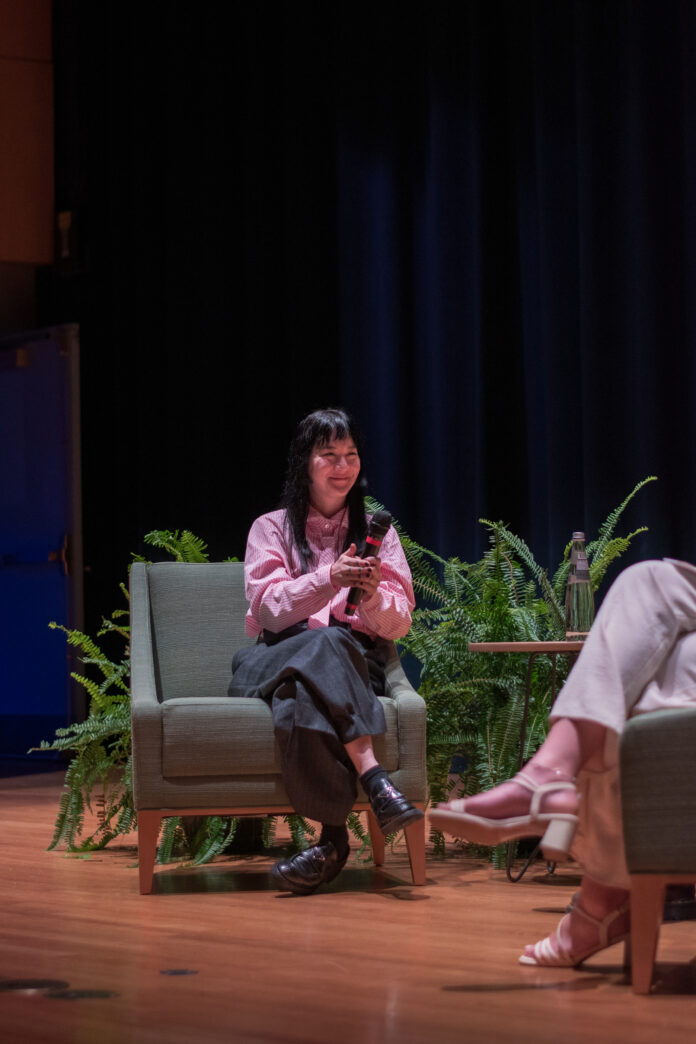Friday, April 4, Michelle Zauner sat stage right on the decorated Commonwealth Auditorium stage. The chairs were arranged simply, but the setting felt intentionally intimate. To her left were moderators Yannie Chang ’25 and Aamnah Malik ’28, executive board members of Wordshop, the creative writing club that helped bring Zauner to campus in collaboration with Student Assembly.
Zauner, lead singer of Japanese Breakfast and author of the New York Times bestselling memoir “Crying in H Mart,” answered 10 questions from Chang and Malik that ranged from reflections on her book and music to her year in Korea and her evolving relationship with grief.
“It starts with just writing it for yourself,” Zauner said.
For her, the deeply personal nature of the book was exactly what allowed it to resonate so widely.
“What is super personal ends up being the most universal thing that connects us,” Zauner said.
She further explained that writing the memoir came from a real, raw necessity to process and express what she had gone through.
“I felt like the only way I could feel understood at that point was if I had kind of written down this very detailed story of what had happened in my life,” Zauner said. “So there were those things that made it easy for me to feel like it was actually really important to kind of lay all of those experiences.”
It was not vulnerability that held her back; it was the fear that it still would not be enough.
“I remember being really devastated when I turned it in and not being happy with where it was, and then nine months went by, I went in to read my audiobook and I hadn’t reread the book in many months. I had been doing a full read-through for three days. I thought, ‘That’s pretty good,’” Zauner said.
It was the kind of moment every writer in the room recognized: that lingering doubt that even your best work might not be good enough, the kind of regret that lives in edits and comma changes. In that moment, it felt like Zauner had said what so many writers in the room had only thought.
Zauner’s approach to writing is all about breaking things down into manageable chunks. She is a big fan of the Pomodoro method. For “Crying in H Mart,” she set herself the goal of writing 1,000 words a day. Zauner advised the writers and creatives in the audience to give themselves small goals, taking a large work step by step.
After the event, Chang and Malik reflected on what it took to bring Zauner to the College of William and Mary. Chang had been hoping to bring a minority author to campus for a while, and this was the first time it really came together. Malik ended up taking the lead on a lot of the coordination by reaching out to Zauner’s managers, figuring out logistics and working around the usual scheduling hurdles. The two of them worked closely with Sen. Hazel Vineet ’25 and Sen. Matthew Hwang ’25, who wrote the bill that made the event possible.
Even after the bill passed and plans were in motion, a last-minute debate over funding nearly threw things off course. Just before an SA meeting, Vineet was informed that a decision needed to be made about whether to move forward with the event and its funding due to concerns over insufficient attendance, as the event was proposed to have 400 guests. Event planners noted the situation brought to light the frustration that student organizations often face when dealing with the complexities of campus politics.
Still, both Chang and Malik said the event made it all worth it. Seeing the audience fully engaged, asking questions, talking about their heritage and discussing Zauner’s music was the kind of response they had hoped for. As writers themselves, they were especially moved by Zauner’s honesty about her creative struggles. Hearing her speak candidly about those challenges gave them permission to push their own boundaries and trust the process of growth.
For Chang, it marked a milestone after years of wanting to bring a writer like Zauner to campus. For Malik, a freshman just starting out her collegiate creative journey, it was a reminder that the kind of creative work she wants to do — writing, organizing, making space for stories — can happen here at the College.

